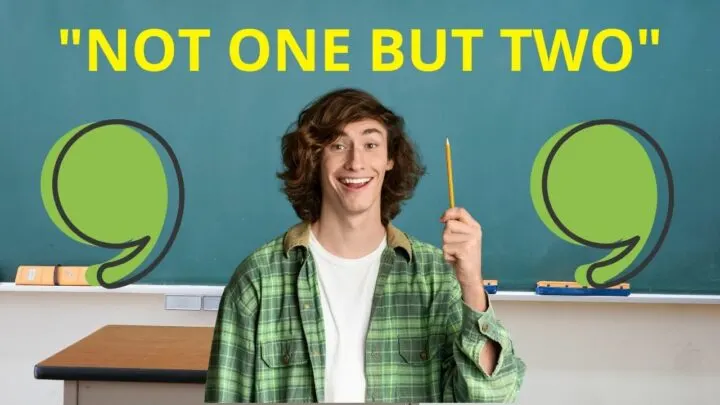Just when you think you might be mastering the comma in English, you might come across an idiom or set phrase that can add some confusion.
Every language has expressions and phrases that would not make a lot of sense if you took them literally or broke them down into their individual components.
“Not one but two” is one of those phrases. When you see this in a sentence, you might wonder why it is used and how to punctuate it.
The answers to all these questions are below.
Do you need a comma before or after “not one but two”?
Most of the time, you do not need a comma with the phrase “not one but two.” You do need a comma after it if it comes at the end of an independent clause that is connected with another independent clause by a conjunction.
“Not one but two” without commas
The vast majority of the time, you would use the phrase “not one but two” without commas because usually, it is an essential phrase.
However, you may be wondering why you would use this phrase in the first place.
Why use the phrase “not one but two”?
If you look at sentences that contain the phrase “not one but two,” your questions might be “why are the words ‘not one but’ in the sentence at all? Why can’t you just say ‘two’?”
The reason is that the words “not one” add emphasis.
Here are a couple of examples:
Sports cars are pretty expensive, so in the first sentence, the phrase emphasizes that the speaker is a big spender.
In the second sentence, the phrase emphasizes the dishonesty of the person who asked someone to lie.
“Not one but two” as an essential phrase
In most cases, “not one but two” acts as an essential phrase in the sentence.
This means that if you removed it from the sentence, the meaning would change or the sentence would not make sense.
Note that the phrase can appear in different places in a sentence, but it does not need commas wherever it appears:
They have not one but two houses on the beach.
I told her to bring me a doughnut. When she arrived, she had not one but two.
“Not one but two” with a conjunction and independent clause
When two independent clauses are joined with a conjunction, there is a comma at the end of the first independent clause before the conjunction.
As you saw above, “not one but two” can come at the end of a sentence. Therefore, if it is followed by a conjunction and another independent clause, you need a comma after it:
I was hoping that they wouldn’t be sold out of power cords. They had not one but two, and I purchased both of them.
Hurricanes are common here. Last month we had not one but two, so we are moving inland.
“Not one but two” as a nonessential phrase
Occasionally, “not one but two” appears in a sentence as a nonessential phrase. When it does, it is elaborating on a noun.
Like all essential phrases, it should be set off from the rest of the sentence by commas.
When it is used in this way instead of as an essential phrase, it emphasizes the noun even more strongly.
She had guns, not one but two, so we knew she meant business.
They have mansions, not one but two, so they must be rich.
While you can use commas in these types of sentences, note that you might more commonly see that phrase set off with dashes:
You would use dashes instead of commas when you wanted to make the emphasis even stronger.
Do you want to step the emphasis up even more? If the phrase is set off from the rest of the sentence using dashes, you could add a comma after “one” to indicate a pause, which creates additional emphasis:
Variations of the phrase “not one but two”
It is worth noting that you will often see variations on this phrase, such as “not just one but two” or “not one but several.”
In general, these should all be punctuated in the same way that “not one but two” is:
They have not one but several ideas that I think would be helpful.
Frequently asked questions on the punctuation of the phrase “not one but two”
Is there a comma after “but” in the phrase “not one but two”?
There is no comma needed after “but” in the phrase “not one but two.”

Hey fellow Linguaholics! It’s me, Marcel. I am the proud owner of linguaholic.com. Languages have always been my passion and I have studied Linguistics, Computational Linguistics and Sinology at the University of Zurich. It is my utmost pleasure to share with all of you guys what I know about languages and linguistics in general.

